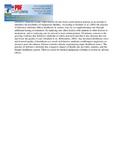| dc.description.abstract | Defensive medicine occurs when doctors deviate from sound medical practice in an attempt to minimize the possibility of malpractice liability. According to Studdert et al. (2005) the practice of defensive medicine affects healthcare in various ways by (a) supplementing care through additional testing or treatment, (b) replacing care when doctors refer patients to other doctors or institutions, and (c) reducing care by refusal to treat certain patients. Of primary concern is the growing evidence that defensive medicine is widely practiced and that it may increase the cost and lower the quality of care (Studdert et al.; Robeznieks, 2005). Any increased healthcare costs and lowered quality of healthcare as a result of defensive medicine could impact negatively on resource poor sub-saharan African countries already experiencing major healthcare issues. The practice of defensive medicine has a negative impact on health care providers, patients, and the broader healthcare system. There is a need for medical malpractice reforms to reverse its adverse effects. | en |

